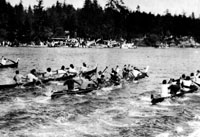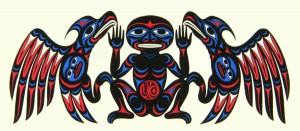kirk/mod2
http://www.indigenousfoodsystems.org/
This is an interactive website where people can share information, stories, recipes in regards to food security. Food security is becoming concern for all peoples. More and more community gardens are being started in Vancouver. UBC farms is a good example. They various participants from Musqueam First Nation to a garden section designated to residents from the downtown Eastside. For anyone interested in learning more about Food sovereignty this is a good website.
Working Group on Indigenous Food Sovereignty
The Working Group on Indigenous Food Sovereignty (WGIFS) was born in March of 2006 out of a recognized need to carry the Indigenous voice in the various meetings, conferences and discussions that have taken place within the food security movement. Through participation in the B.C. Food Systems Network Annual Gathering and strategic planning meetings, the WGIFS was created for the purpose of increasing awareness of the underlying issues, concerns and strategies impacting food security in Indigenous communities. The WGIFS seeks to apply culturally appropriate protocols and ancient ways of knowing through a consensus-based approach to critically analyzing issues, concerns and strategies as they relate to Indigenous food, land, culture, health, economics, and sustainability.
October 8, 2010 No Comments
kirk/mod2
http://www.virtualmuseum.ca/Exhibitions/Traditions/English/history_games.html
 This website was created with funds from Indian and Northern Affairs Canada. It looks at the history of the Indigenous games. It has some good resources that could be used in a class. Detailed history about traditional games/sports of Indigenous peoples in Canada. A worthwhile look!
This website was created with funds from Indian and Northern Affairs Canada. It looks at the history of the Indigenous games. It has some good resources that could be used in a class. Detailed history about traditional games/sports of Indigenous peoples in Canada. A worthwhile look!
October 8, 2010 No Comments
kirk/mod2
http://www.sfu.museum/time/en/panoramas/long-tool
The Salmon Story
When the Creator was still creating Mother Earth, there were a lot of things we have today that were not here at the beginning. For food we had a lot of meat. There were deer, elk, bear but when you eat meat you always have a heavy feeling in your stomach. You feel weighted down. Our people prayed to the Creator for something different, something lighter. The Creator spoke to a Siam and gave him instructions. “You make a dip net and go to the river. There you will see something swimming in the river, these are salmon. Dip one out and roast it by the fire. Share this food with your people. Then gather up all the salmon bones, place them on cedar bark and return them to the river. The river will take the bones back to the salmon people who live in the Sea. If you don’t show your respect in this way, not many salmon will return to the river. You have to give thanks to the Salmon People for sending their children up the river to feed us.”
This is how the Creator gave us the salmon.
Told by Ed Leon, Chehalis. Retold by Frank Malloway.
This is just one example of the rich culture that is presented on this website. The website has a wide range of resources, from games, audio, video. This website was done in partnership with SFU and Xá:ytem Longhouse in Mission which is part of the Sto:lo peoples territory.
October 8, 2010 No Comments
Kirk/Mod2
 http://web.uvic.ca/hrd/hulq/index.htm
http://web.uvic.ca/hrd/hulq/index.htm
This website was created by the University Of Victoria. It is an introduction to Hul’q’umi’num’ which is one of the Coast Salish languages. The website has a variety of exercises to assist learners with the language. It is a good example of using how technology can be used to assist in preserving a language and teaching a language. Many Elders are passing on and they would traditionally played a significant role in teaching a language. Also many First Nations live away from their home community so using a website like this assists in keeping our languages alive.
October 8, 2010 No Comments

